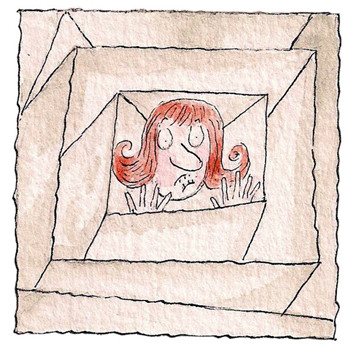(单词翻译:单击)

Q. Are men more likely to be claustrophobic than women?
问:男性比女性更容易患幽闭恐惧症吗?
A. The opposite seems to be true, as is the case in almost all anxiety disorders, large epidemiological studies have found. The reasons for such a gender difference are not clear, and claustrophobia, the feeling of extreme panic when faced with being in a confined or enclosed space, is not as well studied as some other phobias.
答:不。几乎所有关于焦虑症的大型流行病学研究都显示,事实恰好相反。人们尚不清楚为什么会出现这样的性别差异,对于幽闭恐惧症(患者在面对局限或封闭空间时会感觉极度恐慌)的研究也不像其它恐惧症那样充分。
One situation that has been comparatively well researched is what happens when people need magnetic resonance imaging, which often involves a prolonged period of confinement in a small enclosure, the perfect storm of claustrophobia triggers.
目前研究相对深入的是人们接受磁共振成像检查时的情况。此时人需要长时间待在仪器内部的狭小封闭空间中不能乱动,非常容易触发幽闭恐惧症。
A recent study found that certain factors seem to correlate with an increase in claustrophobic reactions, including being female, going into the scanner head first and having a previous negative experience with the test. Another large study involving scanners with a shorter chamber and noise reduction found a significant reduction in claustrophobic reactions, but being female and middle-aged were still associated with a higher rate of claustrophobia.
最近的研究发现,有一些因素似与幽闭恐惧反应的增加相关,其中包括性别为女性、第一次进入扫描头、在以前的检查中曾有过负面体验等。另一项大型研究使用了腔室较短并经过降噪的扫描仪,结果发现幽闭恐惧反应显著减少,但身为女性和年届中年仍与较高的幽闭恐惧症发生率相关。
It has often been assumed that claustrophobia develops as a response to a traumatic experience, like being trapped in a closet as a child, but newer research suggests a genetic component. In one study in mice, a single defective gene was associated with claustrophobia.
人们通常认为,幽闭恐惧症的发生是对创伤性经历(如儿时被困在衣柜里)的反应,但新的研究表明,遗传因素在其中也有一定的作用。小鼠研究发现,有一个单基因缺陷与幽闭恐惧症相关。


